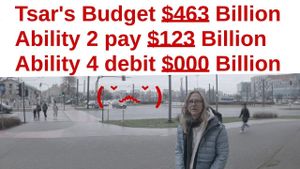Israel has intensified its military operations against Syrian targets, conducting significant airstrikes on Monday against military sites located along the coastal Tartous region of Syria. According to the Syrian Observatory for Human Rights, these air attacks are described as "the heaviest strikes" seen across the area in over ten years.
The backdrop to these military maneuvers hinges on recent developments within Syria, particularly following the collapse of the regime under President Bashar al-Assad. The strikes are seen not just as retaliation but also as part of Israel’s broader strategy to counteract potential threats emanated from Syria, particularly from hostile militia groups.
Notably, the Israeli government on Sunday approved plans aimed at significantly increasing the number of settlers in the Golan Heights, territory Israel captured during the 1967 Six-Day War and later annexed. The decision to expand settlements came alongside the chaos gripping Syria and reflects Israel's assertion to act "in light of the war and the new front facing Syria" as articulated by government officials.
The strikes and settlement expansion arrive during tumultuous times, as reports reveal over 7,600 Syrian migrants crossed back to Syria from Turkey within just five days following the regime’s collapse. This movement is indicative of shifting tides and the complex dynamics on the ground as old alliances and power structures undergo unprecedented changes.
Early Monday’s strikes are not just tactical but also potentially strategic, as they might influence future military and political equations. The Israeli military has routinely targeted Iranian positions and weapons depots thought to be supporting anti-Israeli proxy forces within Syria. Previous strikes have primarily focused on sites believed to house advanced weaponry or facilities related to Iranian military forces.
Additional layer to the situation includes international responses. The United Kingdom confirmed on Sunday evening it had engaged in "diplomatic contact" with Hayat Tahrir al-Sham (HTS), underscoring the convoluted and often contradictory nature of alliances within the region. While HTS is considered by some as a terrorist organization, others view them as pivotal players within the Syrian opposition, exemplifying the dualities at play.
On the diplomatic front, Qatar is preparing to reopen its embassy in Damascus, signaling potential normalization efforts amid the shifting landscapes of power. Concurrently, French diplomats are set to visit Syria soon to assess the prevailing situation. This array of diplomatic activities coincides with rising tensions and violence underscored by Israel's military operations and settlement expansions.
By reaffirming its intentions within occupied territories, Israel is signaling its long-term strategic visions, prioritizing security concerns and territorial claims. These movements, layered with military aggression, reflect Israel's decisive posture as it aims to preemptively counter hostile threats from within Syria.
The ramifications of Israel's recent actions extend beyond the immediate military objectives. They are intricately tied to broader geopolitical currents and imply significant shifts within regional power balances. The combination of military strikes, settlement policies, and diplomatic engagements indicates the complexity of decision-making layers as stakeholders navigate through the chaotic aftermath of the Syrian conflict.
Analysts fear these developments might escalate hostilities even more, with potential backlash not only from Syrian forces but also from allied militias and Iran. It’s imperative for observers of the conflict to remain vigilant as the situation continues to evolve, as each action taken could trigger unforeseen reactions and outcomes.
With these developments, the international community watches closely as the balance of power dictates new realities within the Middle East, driving home the importance of collective conversations aimed at stability and resolution. The recent strikes exemplify not just military might but also the strategic calculus shaping the future of Israeli-Syrian relations amid persistent unrest and rivalry.



